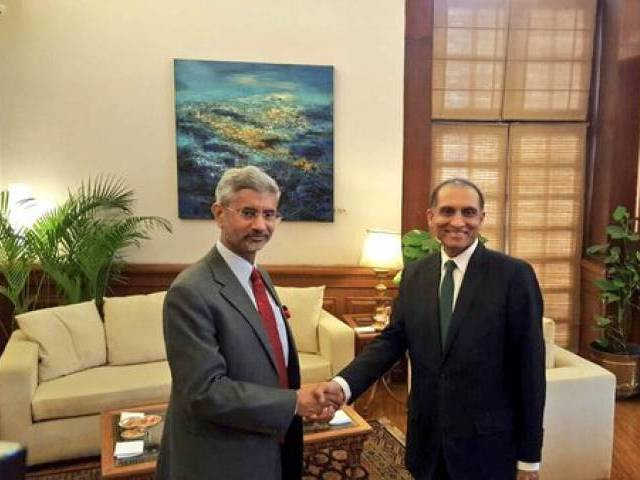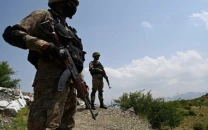No headway in talks with Jaishankar during New Delhi meeting, says Aizaz
Foreign secretary says India refused to give timeframe for start of bilateral talks

Foreign Secretary Aizaz Ahmed Chaudhry shakes hands with his Indian counterpart Subrahmanyam Jaishankar on Tuesday. PHOTO: MEA INDIA
Islamabad on Wednesday admitted that the recent foreign-secretary level talks between Pakistan and India could not achieve any ‘major breakthrough’ as New Delhi refused to give any timeframe for the start of comprehensive bilateral dialogue.
Foreign Secretary Aizaz Ahmed Chaudhry and his Indian counterpart S Jaishankar met in New Delhi on Tuesday on the sidelines of the Heart of Asia-Istanbul conference as part of latest efforts to break the impasse in bilateral ties.
Islamabad conveys 'serious concerns' to New Delhi over RAW's involvement
Speaking to reporters here on his return from New Delhi, the Pakistani foreign secretary indicated that no headway was made as far as the formal start of the composite dialogue with India was concerned.
“India has not given any date for the meeting of foreign secretaries,” Aizaz said. He said although, India agreed that the dialogue was the only way forward to resolve all outstanding issues, no major breakthrough was achieved during the talks.

Asked to identify the obstacles in the resumption of peace talks, the foreign secretary said the question should be put to the Indian government. “Pakistan believes in sustained and structured dialogue. We will welcome whenever India is ready for the dialogue,” he added.
The two countries agreed to resume the comprehensive bilateral dialogue in December last year following talks between India’s External Affairs Minister Sushma Swaraj and Prime Minister’s Adviser on Foreign Affairs Sartaj Aziz.
Pakistan cannot be in denial about terrorism on its soil: India
As part of the understanding, foreign secretaries were to meet in January to work out a roadmap for a series of meetings between officials on issues ranging from Kashmir, peace and security, Sir Creek, Siachen, trade and commercial ties, people-to-people contact and water issues.
However, the dialogue process was derailed after militants stormed the Indian airbase near the border with Pakistan in early January.
New Delhi held militants from the Pakistani based Jaish-e-Mohammad responsible for the attack. Pakistan condemned the attack and formed Joint Investigation Team (JIT) to help India probe the incident.
The JIT recently visited India and the site of the terrorist attack at Phathankot airbase. The final report has yet to be made public but initial foreign office reaction suggested that the Pakistani team was given a limited access by the Indian authorities.
Indian reluctance to move ahead with the dialogue process is apparently linked to the progress on Pathankot investigation. During talks in New Delhi, the Indian foreign secretary sought ‘early and visible’ progress into the Pathankot investigations.
The Pakistani foreign secretary said Pakistan ‘firmly but politely’ raised all issues of its concerns with India in an ‘open and frank’ manner. He said Pakistan clearly told the Indian side that Kashmir remains the core dispute between the two countries and also called for the early commencement of bilateral dialogue as agreed between the two neighbors.
Dialogue with Pakistan not suspended: India
The foreign secretary said he also conveyed its serious concerns to the Indian side over Research and Analysis Wing’s (RAW) activities in the internal affairs of Pakistan.
While deadlock on the resumption of talks persists, the two countries had commonality of views on people-to-people contact and humanitarian issues such as prisoners release. Aizaz said both Pakistan and India agreed that people-to-people contact must remain intact irrespective of the state of bilateral relations between the two countries.
Afghan peace process
The foreign secretary said Pakistan, Afghanistan, China and the US under the banner of Quadrilateral Coordination Group (QCG) remained engaged in facilitating the direct talks between the Afghan government and the Taliban representatives.
Aizaz said Pakistan’s message for all militant groups in Afghanistan was clear, which was to stop violence. He said Pakistan strongly condemned the recent Kabul attack and will not accept such violent tactics by militant groups. He urged all militant groups to shun violence and join the peace process.
Published in The Express Tribune, April 28th, 2016.



















COMMENTS
Comments are moderated and generally will be posted if they are on-topic and not abusive.
For more information, please see our Comments FAQ